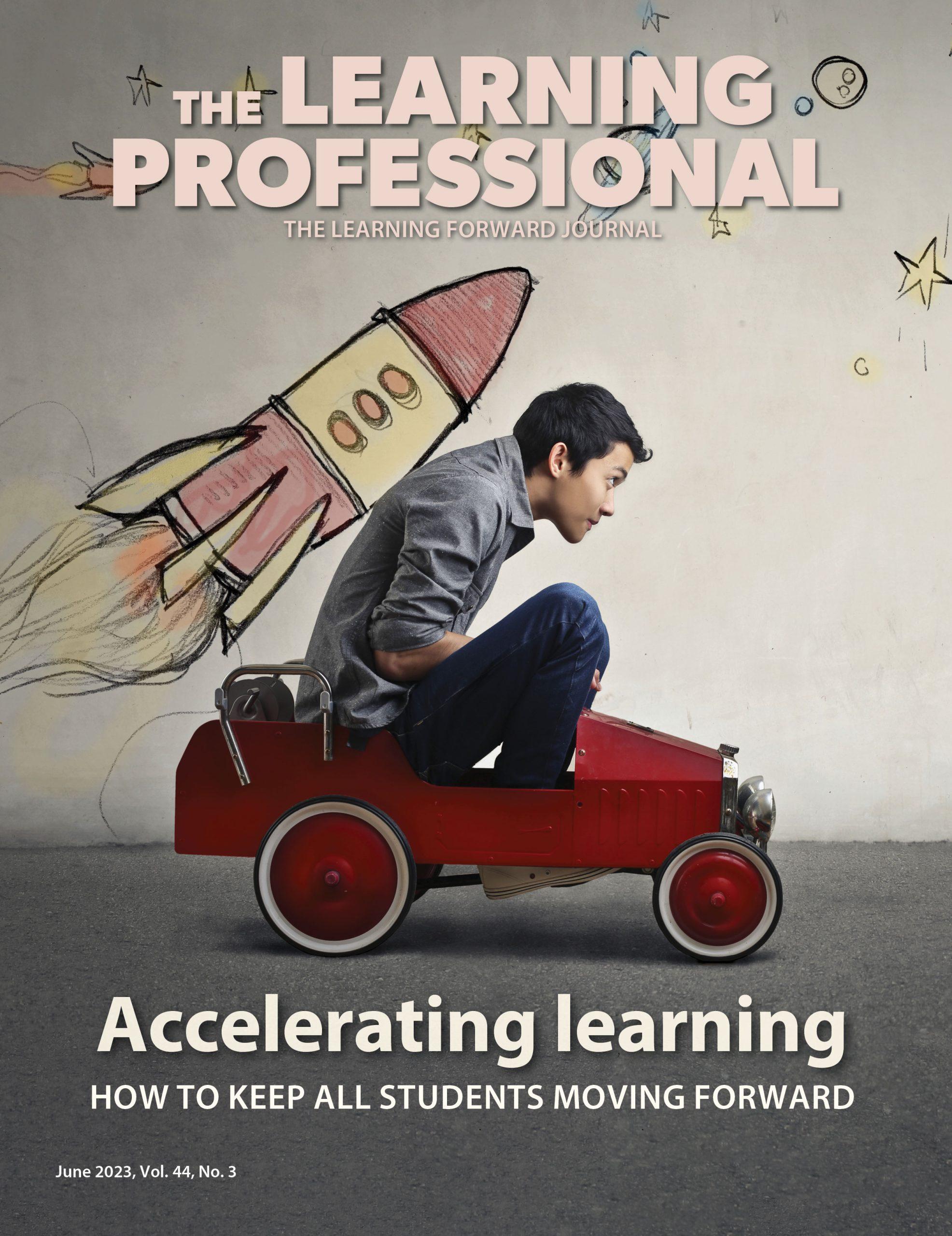FEATURE ARTICLE
Strategies Click Into Place
Online resources translate research to practice
By Learning Forward
April 2012
Vol. 33 No. 2
Teachers might feel they take a risk every time they are asked to try out a new practice recommended by an expert or a researcher. It takes a lot of time and effort to learn a new strategy, prepare for class, and spend class time on implementation. While it might be reassuring to know that the practice has been researched and shown to help improve student learning, research seldom provides enough information to help teachers replicate the practice (Cochran-Smith & Zeichner, 2005). Researchers sift through the details to identify key principles (McIntyre, 2005), leaving teachers to figure out how to adapt practices in their classrooms (Penuel, Fishman, Yamaguchi, & Gallagher, 2007). Teachers who don’t understand why a certain practice might work better than the one they already know could be reluctant to put it into everyday practice (Gersten, Chard, & Baker, 2000).
Providing professional development to teachers is key to using research-based practices when it provides the rationale for those practices and examples of implementation. With today’s budget cuts, however, professional development resources are not always available locally or may be too expensive for schools and districts to develop on their own (Lock, 2006). Many districts are unable to provide schools with the number of professional development days they need.
Asynchronous online learning, which is done at the time and location convenient to the learner without depending on group teaching schedules, empowers busy educators to learn research-based practices appropriate to their goals and level of expertise. Such resources build on the assumption that teachers who take responsibility for their professional growth are more likely to make the connection to their classroom practice (Brown & Edelson, 2003). Many institutions of higher education and professional development providers have increased their online learning offerings as part of teacher preparation programs (Allen & Seaman, 2007) and teacher professional development (Masters, de Kramer, O’Dwyer, Dash, & Russell, 2010).
However, the format of the professional development makes a difference in how effectively teachers are able to implement research-based practices. A recent study of public school teachers in the Chicago area reported that teachers avoid research summaries if they are dry, overly wordy, or jargon-filled. Formats that help teachers learn include concise lists of research findings, practical examples, and audiovisual components (Miller, Drill, & Behrstock, 2010). A second study included interviews and surveys of teachers enrolled in a course on classroom management in a Chicago suburb, and findings were similar: Teachers prefer examples of real classroom situations that highlight implementation actions associated with research (Drill, Miller, & Behrstock-Sherratt, 2012). These principles of good presentation are embodied in the Doing What Works website (https://dww.ed.gov).
Doing What Works Initiative
The Doing What Works Initiative promotes the use of evidence-based practices to improve teacher practice and support school and district implementation. Doing What Works provides an array of resources educators need for school improvement. Doing What Works was created as a resource for professional development and technical assistance providers as well as teachers, coaches, counselors, and administrators looking for professional development materials. The website content is organized by topic (e.g. preschool language and literacy, adolescent literacy, fractions, critical foundations for algebra, and others), and within each topic, resources are featured under each research-based practice.
The Doing What Works website is intended to be a practical companion to high-quality syntheses of research, such as the one produced by the What Works Clearinghouse. Doing What Works is led by the U.S. Department of Education’s Office of Planning, Evaluation & Policy Development, which relies on the Institute of Education Sciences to evaluate and recommend practices supported by rigorous research.
The website is organized around a three-step cycle of learning, seeing, and doing (see table above). The first step of the cycle is “Learn What Works,” where teachers can learn the key concepts of a practice, its rationale, and the nature of research studies supporting it. This section appears for every practice and includes an expert interview, a multimedia overview, and links to related websites.
The next step, “See How It Works,” shows how others have implemented the practice. For this section, Doing What Works features schools and districts around the nation that have used the research-based practices and consequently improved the outcomes of diverse student populations. Media clips depict classroom observations and interviews about decision-making processes, and sample materials from schools and districts can be downloaded.
The third step, “Do What Works,” supports plans for inservice, coaching, and implementation of organizational and instructional practices. Planning templates for state departments of education, district offices, and schools detail the factors that affect successful implementation. This section also provides tools for planning workshops about research-based practices and developing an implementation plan that is specific to the research-based practice. A section called “Ideas for Action” demonstrates which media and documents can be used to address common questions raised by administrators and educators.
Lessons Learned From Implementation
In 2010, the Doing What Works Initiative invited state departments of education, school districts, and nonprofit organizations to submit proposals for the use of Doing What Works materials. More than 90 applicants submitted ideas and, of those, 26 were selected, including institutions of higher education, school districts, national associations, and nonprofit organizations that provide professional development to school districts. These projects, which piloted the use of the Doing What Works online resources over a six-month period, ranged from large-scale dissemination at the national, state, or regional level to individualized support of coaches, teachers, and preservice teachers. Large-scale projects typically drew on multiple topics to create systemic initiatives, such as Internet-based professional development and training materials to support the work of a network of mentors. Clusters of districts or schools, at times working with an external partner or intermediary, built on the expertise of their partners that identified Doing What Works resources for them and used those resources to deliver professional development and technical assistance. Faculty members at several universities integrated these resources into teacher preparation programs by revising course syllabi and creating guidance for observing preservice teachers in the classroom.
From these experiences, we learned about the importance of accessible, high-quality online resources for educators. As one example, the George Washington University Center for Equity and Excellence in Education worked with Accomack County Public Schools in Virginia to provide technical assistance and professional development using Doing What Works resources. Activities started with an overview of Doing What Works resources and focused on six professional development sessions. Between sessions, learning community members incorporated the newly learned research-based practices into their teaching, then met to discuss their experiences. At the end of the sessions, they shared their learning with staff at their schools. Evaluation findings showed a substantial increase in participants’ knowledge of research-based practices (Acosta, 2011). The implementing team noted that the project’s success depended on practitioner-friendly presentations that helped teachers learn principles and strategies during formal professional development and see strategies modeled through examples, visual support, and learning by doing.
The project team provided opportunities to practice, reflect, and receive feedback from peers and expert coaches. During those sessions and as they applied their knowledge in school, teachers received support and encouragement from peers as well as school and district leaders.
In a project overseen by the New York City Department of Education, eight middle schools dedicated one inquiry team per school to pilot the integration of Doing What Works resources into their inquiry process. They looked at the online resources as a framework for determining what was research-based and instructionally sound. Using this framework, team members scrutinized and vetted resources on their own. Teams met biweekly to discuss their experiences in learning about research-based practices and weaving these practices into their instruction. In some cases, inquiry team members followed implementation examples from schools featured on the Doing What Works website, and in other cases, they used the website as a launchpad for more comprehensive exploration of other websites or literature to identify resources (e.g. lesson plans and worksheets) for implementing the research-based practices.
A third example is Project Now, a collaboration between the Northern Kentucky Cooperative for Educational Services, a regional collaborative of 18 school districts in northern Kentucky, the Regional Educational Laboratory Appalachia, Northern Kentucky Cooperative for Educational Services Professional Development Consortium, and the mathematics department at the Northern Kentucky University College of Education and Human Services as well as coaches and teachers from seven urban, rural, and suburban districts. Project Now incorporated Doing What Works resources on Response to Intervention in elementary-middle math into existing regional, district, and school professional learning to help instructional coaches increase their knowledge and use of recommended practices. Activities included a summit to introduce Doing What Works materials to math coaches and instructional leaders, meeting with coaches twice monthly on issues regarding implementation of Response to Intervention math, and ongoing interactions between coaches and teachers.
Transition to Common Core
States transitioning to the Common Core State Standards may have a greater need for professional development. While the standards define the knowledge and skills that students should have, they do not tell teachers how to teach. The standards encourage districts and schools to develop or identify materials aligned to the standards. Based on this, some of the project teams saw the relevance of online, research-based resources. The Mid-Iowa School Improvement Consortium, a membership-based organization of more than 150 rural Iowa school districts, assigned math and literacy teams to identify and screen resources and create a database that describes resources most useful to member schools. The database was designed with links to the Doing What Works website and integrated into the consortium’s online curriculum-mapping software.
An Effective Solution
Instructional reforms can overwhelm teachers if they are asked to align instruction with new standards or draw on disciplinary knowledge they may not have (Ross, McDougall, & Hogaboam-Gray, 2002). Our experience shows that there is high interest in equipping coaches, mentors, and teacher leaders with online, research-based resources to prepare them to be effective instructional leaders and to help teachers find and implement research-based practices. Earlier research found similar results. A study of teachers’ use of the National Science Digital Library funded by the National Science Foundation found that providing teachers with two workshops about using online resources resulted in greater knowledge, more favorable attitudes toward online resources, and greater use of these resources (Recker et al., 2007).
Workshops and other forms of professional development around online resources can provide support to ensure effective use. Types of support include modeling practices and feedback on teachers’ use of the practices in their classrooms. Support may also include screening resources for relevance and appropriateness to educators with varying levels of knowledge and experience and identifying or developing additional tools that enable context-specific, culturally sensitive adaptation of a research-based practice. Such supports can make using online resources a less demanding and time-consuming task. Direct access to relevant and high-quality materials that demonstrate why experts recommend a specific practice and how other teachers implemented the practice may increase willingness of teachers to try out new, research-based practices in their classrooms.
The work of innovation at school only starts with the adaptation of research-based practices. Research shows that ongoing support that enhances learning outcomes is crucial for setting realistic goals, implementing research-based practices with fidelity, and assessing resulting changes in student outcomes (Drill, Miller, & Behrstock-Sherratt, 2012). The Doing What Works Initiative supports implementation of research-based practices by providing resources educators need for school improvement.
Three-Step Cycle of the Doing What Works Website

References
Acosta, B.D. (2011). Doing What Works: Implementing effective literacy and English language instruction for elementary English learners in Accomack County Public Schools. Unpublished report. Arlington, VA: The George Washington University Center for Equity and Excellence in Education.
Allen, E. & Seaman, J. (2007). Online nation: Five years of growth in online learning. Wellesley, MA: The Sloan Consortium, Babson College.
Brown, M. & Edelson D. (2003). Teaching as design: Can we better understand the ways in which teachers use materials so we can better design materials to support their changes in practice? (Design Brief). Evanston, IL: Center for Learning Technologies in Urban Schools.
Cochran-Smith, M. & Zeichner, K.M. (Eds.). (2005). Studying teacher education: The report of the AERA Panel on Research and Teacher Education. Mahwah, NJ: Lawrence Erlbaum Associates.
Drill, K., Miller, S., & Behrstock-Sherratt, E. (2012, March). Teachers’ perspectives on educational research. Naperville, IL: American Institutes for Research.
Gersten, R., Chard, D., & Baker, S. (2000). Factors enhancing sustained use of research-based instructional practices. Journal of Learning Disabilities, 33(5), 445.
Lock, J.V. (2006). A new image: Online communities to facilitate teacher professional development. Journal of Technology and Teacher Education, 14(4), 663-678.
Masters, J., de Kramer, R., O’Dwyer, L.M., Dash, S., & Russell, M. (2010). The effects of online professional development on fourth grade English language arts teachers’ knowledge and instructional practices. Journal of Educational Computing Research, 43(3), 355-375.
McIntyre, D. (2005). Bridging the gap between research and practice. Cambridge Journal of Education, 35(3), 357-382.
Miller, S.R., Drill, K., & Behrstock, E. (2010). Meeting teachers half way: Making educational research relevant to teachers. Phi Delta Kappan, 91(7), 31-34.
Penuel, W.R., Fishman, B.J., Yamaguchi, R., & Gallagher, L.P. (2007). What makes professional development effective? Strategies that foster curriculum implementation. American Educational Research Journal, 44(4), 921-959.
Recker, M.M., Walker, A.A., Giersch, S.S., Mao, X.X., Halioris, S.S., Palmer, B.B., & Robertshaw, M.B. (2007). A study of teachers’ use of online learning resources to design classroom activities. New Review Of Hypermedia & Multimedia, 13(2), 117-134.
Ross, J.A., McDougall, D., & Hogaboam-Gray, A. (2002). Research on reform in mathematics education, 1993-2000. Alberta Journal of Educational Research, 48(2), 122-138.
Learning Forward is the only professional association devoted exclusively to those who work in educator professional development. We help our members plan, implement, and measure high-quality professional learning so they can achieve success with their systems, schools, and students.
Recent Issues
TAKING THE NEXT STEP
December 2023
Professional learning can open up new roles and challenges and help...
REACHING ALL LEARNERS
October 2023
Both special education and general education teachers need support to help...
THE TIME DILEMMA
August 2023
Prioritizing professional learning time is an investment in educators and...
ACCELERATING LEARNING
June 2023
Acceleration aims to ensure all students overcome learning gaps to do...












